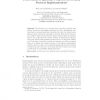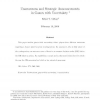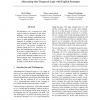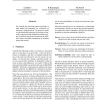TARK
2007
Springer
15 years 7 months ago
2007
Springer
Multiple election paradoxes arise when voting separately on each issue from a set of related issues results in an obviously undesirable outcome. Several authors have argued that a...
TARK
2007
Springer
15 years 7 months ago
2007
Springer
We introduce (i) a general class of security protocols with private channel as cryptographic primitive and (ii) a probabilistic epistemic logic to express properties of security pr...
TARK
2007
Springer
15 years 7 months ago
2007
Springer
This paper studies games with uncertainty where players have different awareness regarding a chance player’s moves (contingencies). An announcer, who is fully aware of the cont...
TARK
2007
Springer
15 years 7 months ago
2007
Springer
We examine four approaches for dealing with the logical omniscience problem and their potential applicability: the syntactic approach, awareness, algorithmic knowledge, and imposs...
TARK
2007
Springer
15 years 7 months ago
2007
Springer
We introduce ATLES – a variant of ATL with explicit names for strategies in the object language. ATLES makes it possible to refer to the same strategy in different occurrences o...
131
click to vote
TARK
2007
Springer
15 years 7 months ago
2007
Springer
We contend that reasoning about knowledge is both natural and pragmatic for verification of electronic voting protocols. We present a model in which desirable properties of elect...
100
click to vote
TARK
2007
Springer
15 years 7 months ago
2007
Springer
In Alternating-time Temporal Logic (atl), one can express statements about the strategic ability of an agent (or a coalition of agents) to achieve a goal φ such as: “agent i ca...
97
Voted
TARK
2007
Springer
15 years 7 months ago
2007
Springer
In this paper we show how coalition logic can be reduced to the fusion of a normal modal STIT logic for agency and a standard normal temporal logic for discrete time, and how this...




